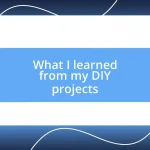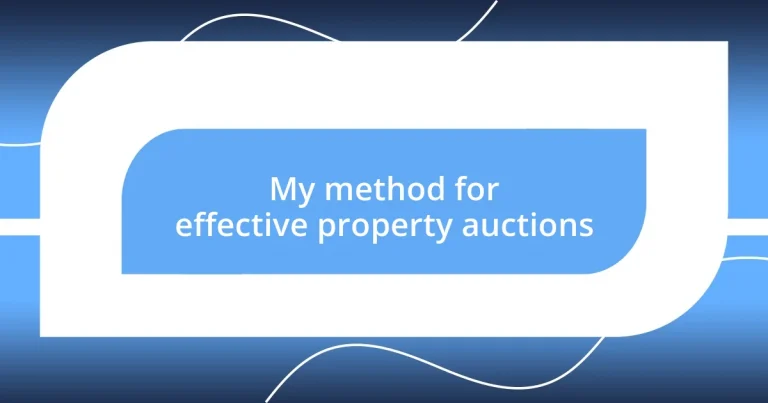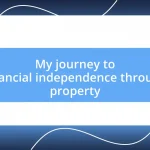Key takeaways:
- Preparation is crucial; research properties, set a budget, and gather necessary documents to build confidence and avoid costly mistakes.
- Effective auction strategies involve understanding market dynamics, setting realistic bidding limits, and maintaining composure throughout the bidding process.
- Post-auction follow-up is essential; review documents, communicate with the auctioneer, and network with other bidders to strengthen future opportunities.
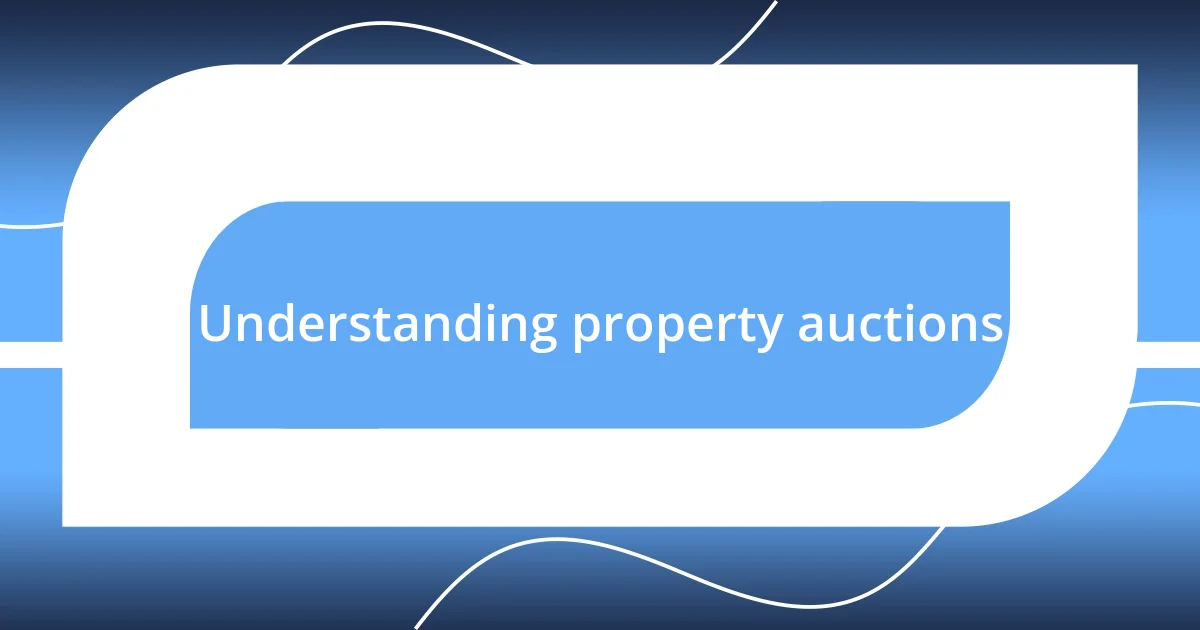
Understanding property auctions
Property auctions serve as a dynamic marketplace where buyers and sellers come together, often resulting in an accelerated buying process. I remember my first auction—it was exhilarating yet nerve-wracking. Would I get the property I had my eyes on, or would I lose it to someone with deeper pockets?
Understanding the auction process is vital for success. Each auction can feel like a chess match, where every bid counts and strategic thinking is essential. Have you ever found yourself holding your breath as the auctioneer’s gavel slams down? That rush of anticipation is unlike any other, and it’s precisely why having a solid game plan makes such a difference.
Bidders should also recognize that property auctions often reveal hidden opportunities, like undervalued properties ripe for renovation. I’ve often found my best deals in auctions, where others might shy away. It’s this blend of risk and reward that adds an element of excitement—after all, aren’t we all seeking that perfect investment that could change our fortunes?
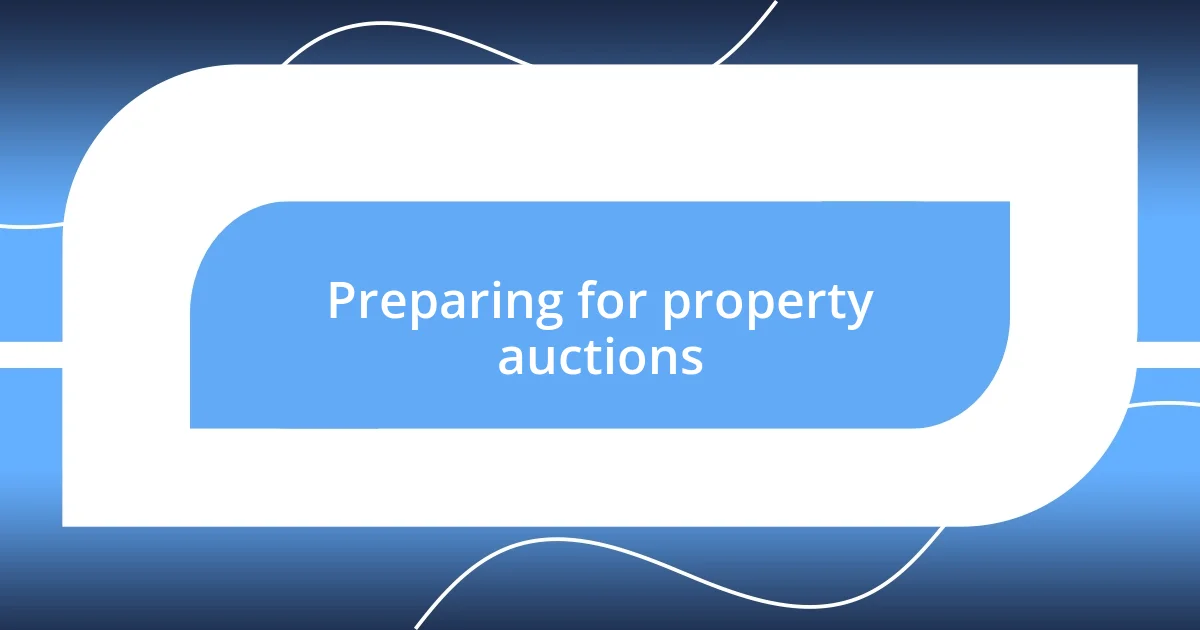
Preparing for property auctions
Preparing for a property auction is like gearing up for a big game. The adrenaline starts to build, and I always feel that rush as the auction date approaches. In my experience, preparation can often make or break your success in this fast-paced environment, ensuring you enter the auction with confidence rather than apprehension.
Here’s a practical checklist that has served me well over the years:
– Research the property: Understand its history, market value, and any potential issues that could arise.
– Set a maximum budget: This not only helps avoid overspending but also keeps your bidding strategy clear.
– Inspect the property: If possible, visit the property beforehand. I’ve found that even a brief walk-through can reveal vital details that photos can’t.
– Connect with experts: Don’t hesitate to speak with real estate agents or auction specialists—they can provide useful insights.
– Gather necessary documents: Ensure all financing is in order and that you have any required paperwork ready.
I remember distinctly a time when I skimped on preparation—I thought I could wing it and learn as I go. Let me tell you, that was a tough lesson! Having a solid plan not only makes you feel more in control but also helps you stand out among the competition.
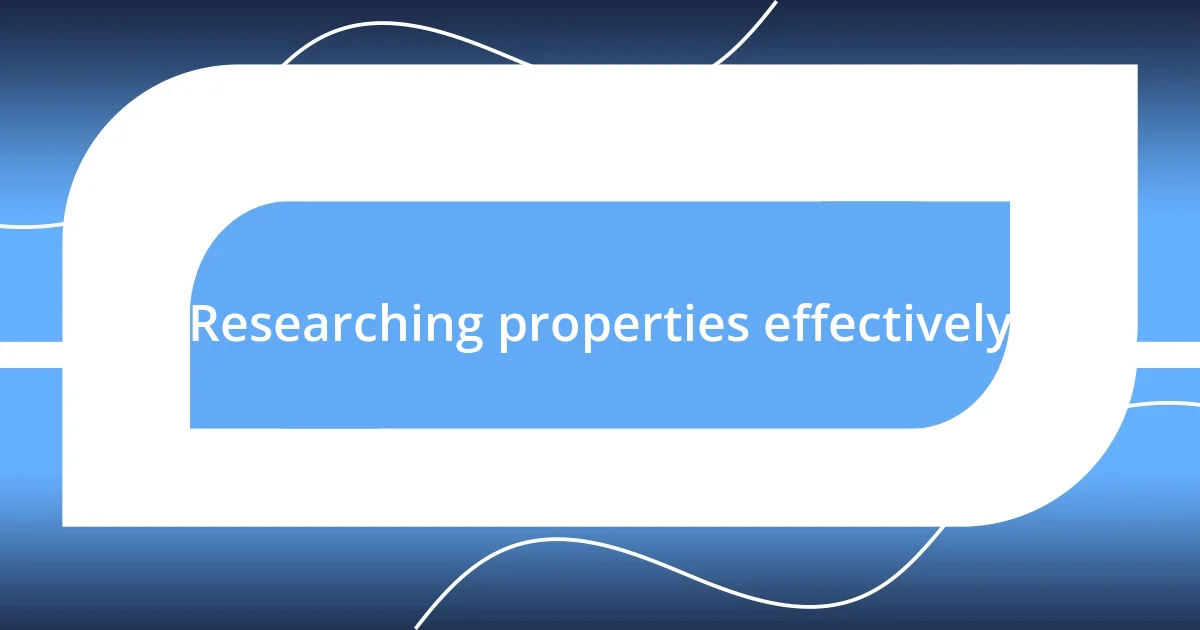
Researching properties effectively
Researching properties before an auction is a crucial aspect that often dictates how successful you will be in securing a good deal. I remember dedicating an entire week to scrutinizing the local property market. Diving into sales records and neighborhood trends not only gave me a clearer picture of property values but also helped me identify the locations that were on the rise. It’s like reading the tea leaves; the more you understand, the better equipped you are to make informed decisions at the auction.
When I research properties, I focus on several key metrics, such as average days on the market, local amenities, and planned developments in the area. These factors can significantly influence a property’s potential value. I recall a property I was interested in that was located near a new transit line being developed. Understanding that it would soon be a hotspot added a layer of confidence to my bidding strategy.
Having a solid research method is essential for navigating property auctions effectively. Compiling detailed comparisons among potential properties allows me to weigh the pros and cons clearly. It’s comforting to enter the bidding arena with a comprehensive grasp of what I’m up against. I urge you to create a structured analysis to streamline your decision-making process; it can make all the difference when the gavel comes down.
| Research Method | Description |
|---|---|
| Online Property Portals | Use websites like Zillow or Realtor.com to gather information on property values and sales history. |
| Local Market Reports | Review reports from local real estate agents to understand neighborhood trends. |
| Public Records | Check local government websites for tax records and property assessments. |
| Networking | Connect with real estate professionals who may provide insights on properties up for auction. |
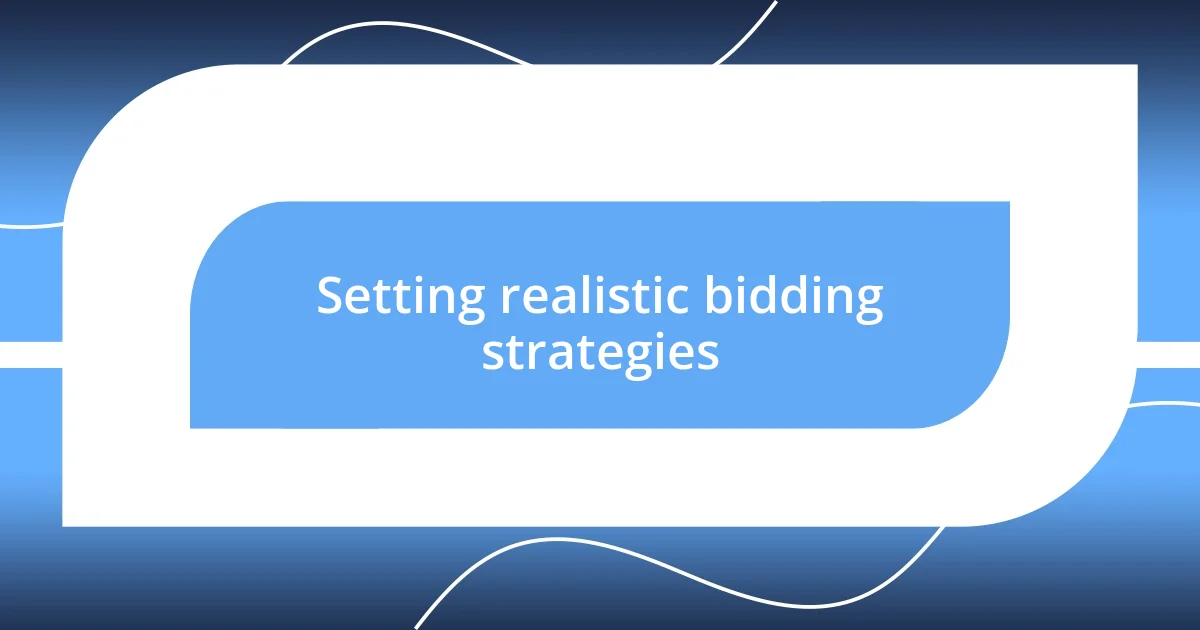
Setting realistic bidding strategies
Setting realistic bidding strategies often hinges on understanding your financial limits and market dynamics. When I enter an auction, I always remind myself not to get swept away by excitement. I’ve learned the hard way that setting a firm maximum bid keeps my emotions in check and prevents impulse purchases. Can you imagine walking out of an auction feeling satisfied because you didn’t overextend yourself? That sense of calm is invaluable.
I also take the time to analyze comparable property sales to guide my strategy. For instance, at one auction, I noticed properties similar to my target had sold for roughly 10% less than the current listing price. Instead of throwing caution to the wind, I decided on a conservative bid that fell within that price range. What ended up happening was surprising—I secured the property and realized later that my cautious approach paid off handsomely. A strategic mindset really can lead to success.
Developing a bidding strategy isn’t just about the numbers; it’s about knowing yourself as well. In my experience, I’ve realized that practice can make a huge difference. Before important auctions, I sometimes simulate bidding scenarios with friends. This exercise helps me gauge my comfort level and refine my tactics. Have you ever practiced for something important? It can truly bolster your confidence when the stakes are high.
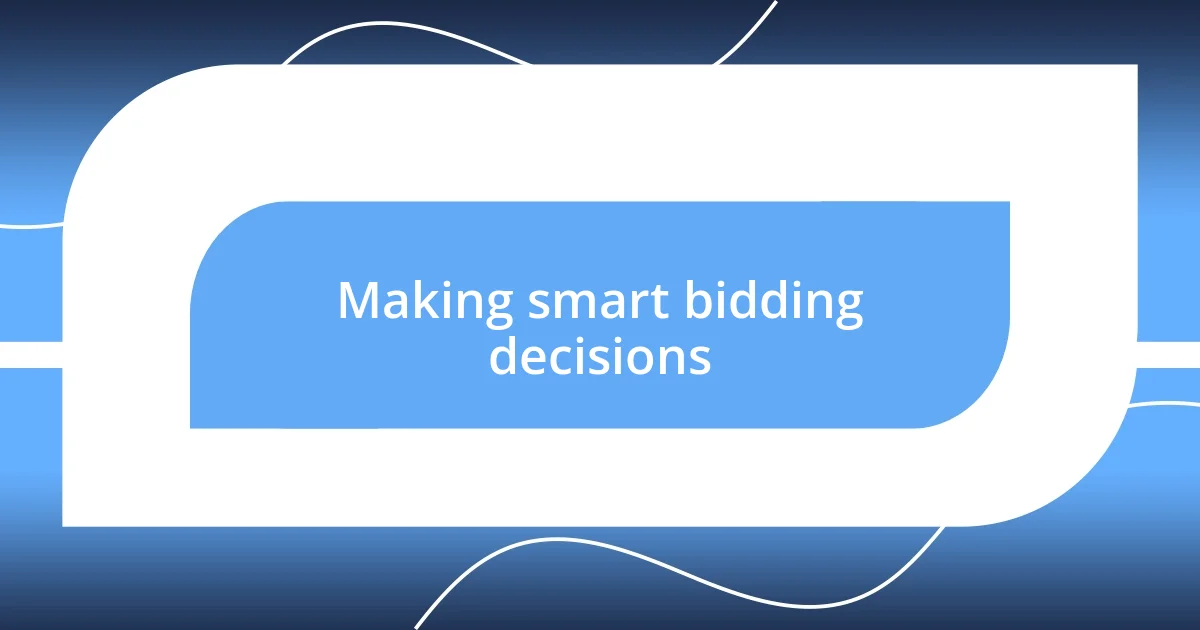
Making smart bidding decisions
Making smart bidding decisions requires a blend of patience and strategy. I recall a particularly intense auction where the atmosphere was electric, and the competitive spirit was palpable. I had set my maximum bid beforehand, and as the numbers climbed quickly, I felt the adrenaline rush tempting me to go higher. But in that moment, I remembered my limits, took a deep breath, and stayed the course. How often do we let emotions cloud our judgment? I learned that day the importance of sticking to your plan, no matter how thrilling the bidding may become.
When considering my bidding approach, I reflect on past auctions where being overly aggressive backfired. One time, I got into a bidding war over a property I had fallen in love with. In my excitement, I ended up paying far above market value, leaving me with buyer’s remorse. That experience taught me a pivotal lesson: some deals aren’t worth the skyrocketing prices. Now, I remind myself to approach each auction analytically, balancing my desire with logical assessment. It’s a delicate dance, but it’s essential for success.
I’ve found that listening to my instincts can also play a crucial role. There was this auction where I sensed hesitation from other bidders after the initial rounds. I decided to place a reasonable bid, which caught everyone off guard. Suddenly, the energy shifted. My calm demeanor made others rethink, and in that moment, I realized that confidence could be just as powerful as knowledge. Are you aware of how your presence impacts the dynamics of the auction? Trusting your gut while backing it with solid research can lead to unexpected victories.
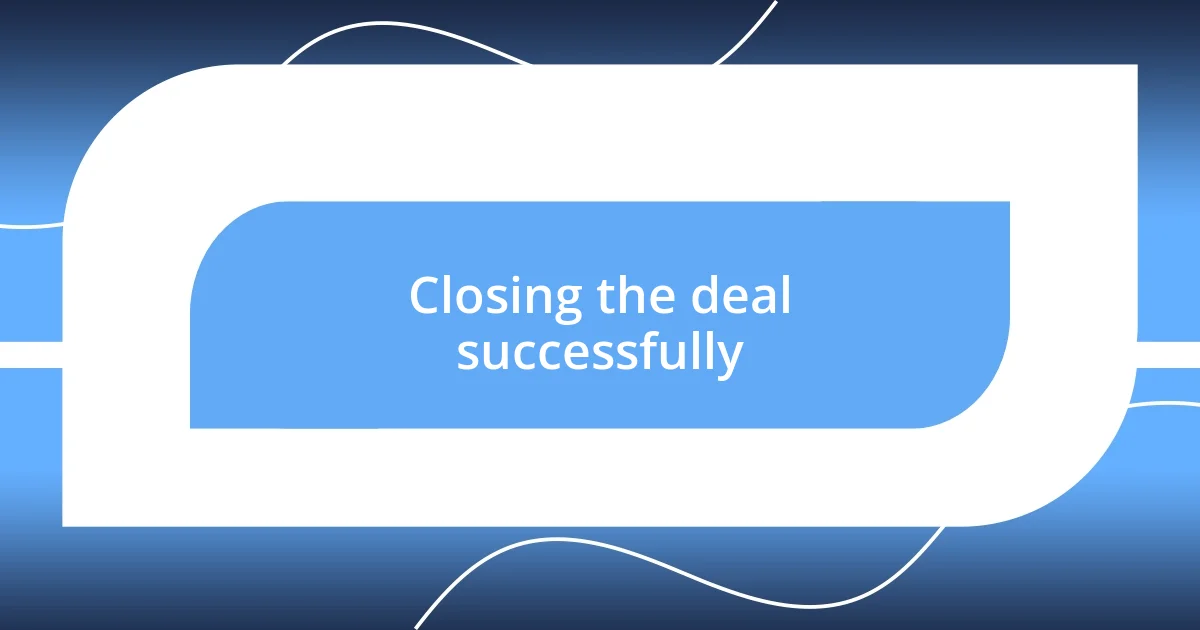
Closing the deal successfully
Closing a deal successfully often comes down to effective communication with the auctioneer and other stakeholders involved. I recall a moment during one auction when I approached the auctioneer with a friendly smile and introduced myself. Engaging in brief conversation not only built rapport, but it also offered insights into the auction’s flow. Have you ever noticed how a little personal connection can change the dynamics in high-pressure situations? It certainly helped me feel more at ease and better understand where my potential competitors might stand.
Once the gavel drops and you’ve won a bid, it’s crucial to stay composed and assertive during the closing process. I vividly remember my first successful bid; as I walked up to complete the paperwork, my heart raced. I realized that maintaining a calm disposition while discussing the terms helped solidify my confidence. Sometimes it’s easy to overlook the human side of these transactions. Do you recognize the importance of fostering a cooperative spirit when finalizing a deal? Creating an atmosphere of professionalism and mutual respect can often lead to smoother negotiations.
Moreover, always be ready to follow through efficiently after winning a bid. I once faced a tense moment after landing a property when I hesitated to finalize the payment due to uncertainty about my financing options. But then, I reflected on my earlier preparations and quickly communicated with my lender to put my plans into motion. That feeling of empowerment is contagious—being proactive in these situations not only secures your win but enhances your standing as a serious buyer. Have you thought about how your readiness can influence the closing stage? It truly can make all the difference in ensuring a successful property auction experience.
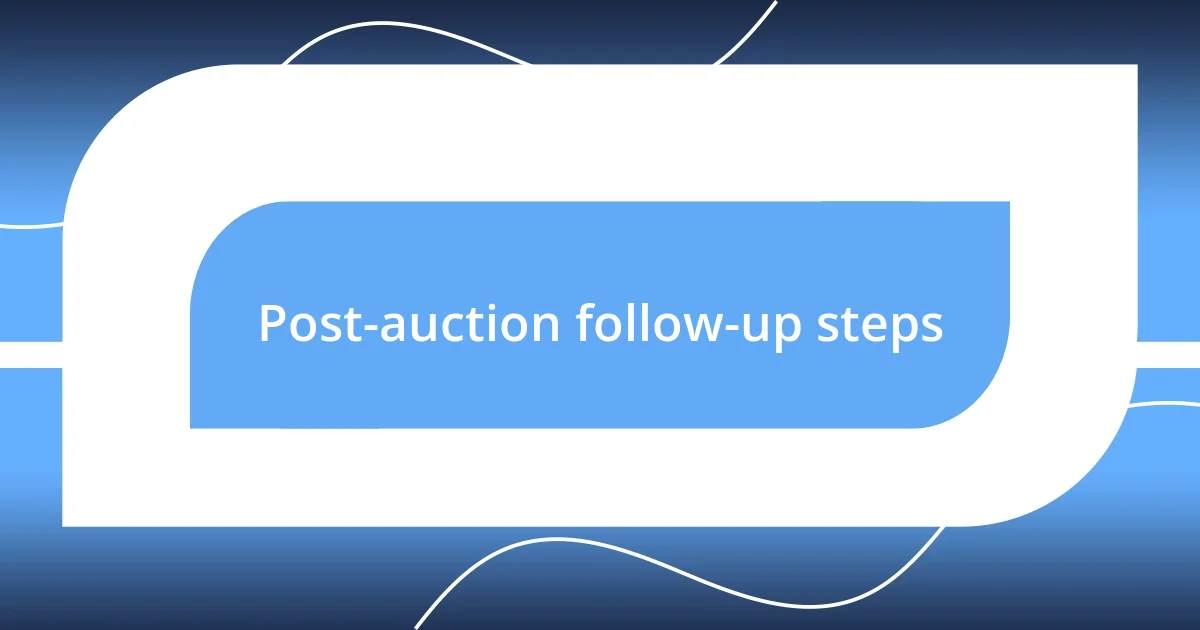
Post-auction follow-up steps
After the auction, the first step I take is to review the auction documents and my bidding strategy. I remember a time when I jumped into the excitement without thoroughly checking the paperwork, which left me scrambling to understand the terms later. Do you realize how vital those details can be? Taking a moment to clarify everything promptly ensures you’re not left in the dark as you move forward.
Next, I prioritize reaching out to the auctioneer. I once missed a crucial opportunity to ask a simple question right after winning a bid, which would have clarified some timeline specifics for me. I felt a bit lost and anxious as a result. Why risk that confusion? A quick chat can solve doubts and help you solidify your next steps. Remember, being proactive showcases your commitment and can lead to smoother transactions down the line.
Finally, I always follow up with other bidders or potential partners I met during the auction. I genuinely enjoy building those connections, as they can prove beneficial in future negotiations. There have been occasions where a simple email led to unexpected collaborations or insights into upcoming properties. Have you thought about the power of networking? It’s more than just making contacts; it’s about creating a community that supports your real estate journey.




